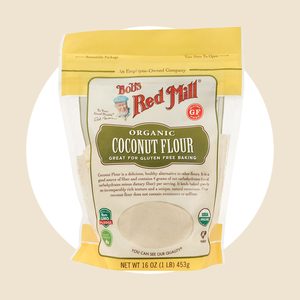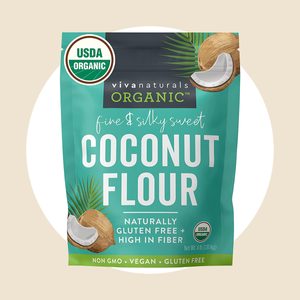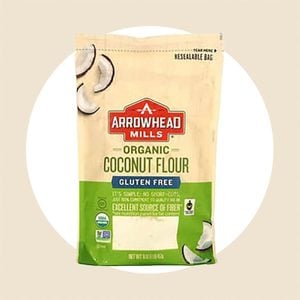What Is Coconut Flour, and How Do I Use It?
Updated: Feb. 14, 2023

Perfect for sweet and savory recipes, coconut flour is a fun substitution when experimenting with gluten-free baking.
One of the oft-overlooked joys of gluten-free baking is the copious amounts of flour alternatives that can be swapped, combined and experimented with to recreate some of your favorite dishes.
There is almost nothing that can’t be made gluten-free! You get to play with certain grains, nuts and even fruit, like coconut, to produce flours that can help with baking.
What Is Coconut Flour?
Coconut flour is a gluten-free flour that can be used in sweet and savory recipes, as well as in coatings or breading for your favorite proteins, like fish or chicken. It’s made from—you guessed it—coconut. Specifically, dried and ground coconut meat. It is rich in fiber and protein.
But this is not your average flour replacement. Other gluten-free flours, like rice or corn, are primarily starch, so they act pretty similar to wheat flours in how they absorb liquids and bind with eggs. Coconut flour is starch-free, and because it’s high in fiber, it absorbs more liquid than other flours. This can lead to denser recipes.
It’s recommended that you limit this type of flour to about 25% of a recipe’s total flour. However, there are always exceptions—I’ve tried 100% coconut flour pancake, bread and cookie recipes that are irresistibly tasty. You can also add extra liquid to your recipe when subbing in coconut flour.
Keep in mind when baking and cooking that this flour does have a distinct coconut taste.
How Long Does Coconut Flour Last?
Coconut flour lasts for six to twelve months if stored in a cool, dark environment. It can last a bit longer in the freezer if stored properly.
Since it contains fat, it can go rancid, so pay close attention to sell-by dates and proper storage.
How Do You Store Coconut Flour?
Before opening, store coconut flour in a cool, dark place. Once it’s opened, you can refrigerate it, transfer it to an airtight container for storage in your pantry, or freeze it in a sealed container.
Where to Buy Coconut Flour
You can buy coconut flour at most grocery stores, whether a major chain or your local co-op. You can also buy it online at Amazon or Target.
Coconut Flour Substitutes
You’ll have better luck subbing in nut flours for coconut flour, rather than grains. Almond flour (perfect for gourmet baking) can be a good bet. However, you’ll use more almond flour than coconut flour as it is much less absorbent. You’ll want to aim for a 4:1 ratio of almond flour to coconut flour (add 4 cups of almond flour for every 1 cup of coconut flour). Whatever you choose to substitute for coconut flour, remember to adjust the ratio and amount of liquid.
If using coconut flour as a thickening agent, you can substitute tapioca flour in a 1:1 ratio.





















